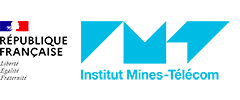
Post-doctoral fellow in digital sociology and sociology of AI - 24 months contract
- Hybrid
- Palaiseau, Île-de-France, France
- Sciences humaines et sociales et Linguistiques
Job description
Who we are ?
Télécom Paris, part of the IMT (Institut Mines-Télécom) and a founding member of the Institut Polytechnique de Paris, is one of France's top 5 general engineering schools.
The mainspring of Télécom Paris is to train, imagine and undertake to design digital models, technologies and solutions for a society and economy that respect people and their environment.
The postdoctoral fellowship will take place in the Digital Technologies, Organisations and Society team of the Social and Economic Sciences departement at Télécom Paris, attached to the i3 laboratory and the Institut Polytechnique de Paris. It takes place in the context of the CHAI ANR project, detailed below.
Artificial intelligence (AI) regroups a large number of actors with heterogeneous positions and guiding principles. One may immediately think of researchers, both in exact and social sciences, but also of regulatory instances, companies making or using AI systems, of newspapers, specialised or not, of think tanks and lobbying groups criticizing the use of AI systems in various contexts, etc. It is indeed a construct with both social and technical aspects (Callon, 1986), that should be studied as such. The European AI Act emphasises this, underlining the “need to clarify the role of actors that may contribute to making AI systems”, as early as in the EU Council draft.
The future AI Act favours a co-regulation approach based on impact analyses, but assessing the impact of an AI system on its environment requires a detailed understanding of the players involved in or affected by the system, their positions and their power relations and influence. The aim of this project is to map out this ecosystem so as, on the one hand, to gain a better understanding of the way in which knowledge about artificial intelligence is built up and updated, and on the other hand to gain a better understanding of the impact of a system on a particular group, in order in particular to gain a better appreciation of the appropriate protective measures.
The actors, their discourses and the controversies that emerge in this space define a social world, comprising all the actors⋅ices, their activities, their links and their productions assimilated to AI; it is a network of collaborations and competitions, within which the same people interact on a regular basis (Becker, 1976). Mapping this social world is precisely the aim of this project proposal. We want to focus on characterising the topology of the AI social world, in that it is a gateway to understanding the mechanisms of association and dissociation, and the mechanisms of explanation that take place there. In his work, H. Becker (1976) emphasises the relational and interactional aspect of the construction of the social world. Thus, we propose to extend and use the formalism of graph theory, which is adapted, both mathematically and algorithmically, to the analysis of large-scale relationships and interactions. However, identifying these actors⋅ices and their positions, i.e. mapping them, involves asking questions about the limits of the social world; about the shared knowledge and the representations common to the participants in this world. A great deal of work, whether applied to artificial intelligence or not, focuses on aspects of these issues. There are several meta-analyses of the many non-binding charters that exist around artificial intelligence (Jobin et al., 2019; Fjeld et al., 2020; Tidjon, 2022; Gornet et al., 2024), and even an initial sketch of its normative arenas (Benbouzid et al., 2022b). It should be noted, however, that in this work the authors are not interested in the relative sizes of each arena. More work is needed to understand the mechanisms at work, the existing sub-arenas and their relative importance in institutional, scientific or media discourse. (Gargiulo et al., 2022) emphasises the relational and interactional aspect of the construction of the social world. Thus, we propose to extend and use the formalism of graph theory, which is suitable, both mathematically and algorithmically, for the analysis of large-scale relationships and interactions. However, identifying these actors⋅ices and their positions, i.e. mapping them, involves asking questions about the limits of the social world; about the shared knowledge and the representations common to the participants in this world. A great deal of work, whether applied to artificial intelligence or not, focuses on aspects of these issues. There are several meta-analyses of the many non-binding charters that exist around artificial intelligence (Jobin et al., 2019; Fjeld et al., 2020; Tidjon, 2022; Gornet et al., 2024), and even an initial sketch of its normative arenas (Benbouzid et al., 2022b). It should be noted, however, that in this work the authors are not interested in the relative sizes of each arena. More work is needed to understand the mechanisms at work, the existing sub-arenas and their relative importance in institutional, scientific or media discourse. (Gargiulo et al., 2022), for their part, focus on academic articles, highlighting the large number of players and terms used. In their article, (Gargiulo et al., 2022) do a similar job, focusing on published scientific articles mentioning artificial intelligence up to 2015.
Main responsabilities :
carry out research missions in the field of digital sociology an sociology of IA
ensure supervision and tutoring missions
contribute to the reputation of the School, the Institut Mines-Télécom and the Institut Polytechnique de Paris
Job requirements
To succeed in this role, you will hold a PhD or equivalent. You will have acquired in-depth theoretical and practical knowledge of
practice of digital regulation and in the sociology of digital and AI. You have an ability to conduct and analyse qualitative interviews. You are proficient in R or Python.
You are known for your team spirit, excellent interpersonal skills and teaching abilities.
Fluency in English is essential for this position.
Why join us?
You'll be working in a fast-growing, pleasant, green and accessible environment (especially for people with disabilities) just 20 km from Paris (RER B and C suburban train lines, close to major roads, shared shuttle departing from Porte d'Orléans). You will benefit from :
49 days annual leave (CA + RTT)
flexible working hours (depending on department activity)
telecommuting 1 to 3 days/week possible
75% public transport pass reimbursement
Proximity to numerous sports facilities, concierge service, underground parking, in-house catering, etc.
Staff association at school and ministry level
Good to know: our social security contributions are lower than in the private sector
Other information :
Application deadline: 21 june 2025
Job type : 24 months fixed-term contract
Job description : here
Scientific contact person : Tiphaine VIARD - tiphaine.viard@telecom-paris.fr
Administrative contact person : Fanny BRULEY - fanny.bruley@telecom-paris.fr
We recruit on the basis of skills, regardless of origin, age, gender identity or sexual orientation, and all our positions are open to people with disabilities.
or
All done!
Your application has been successfully submitted!
